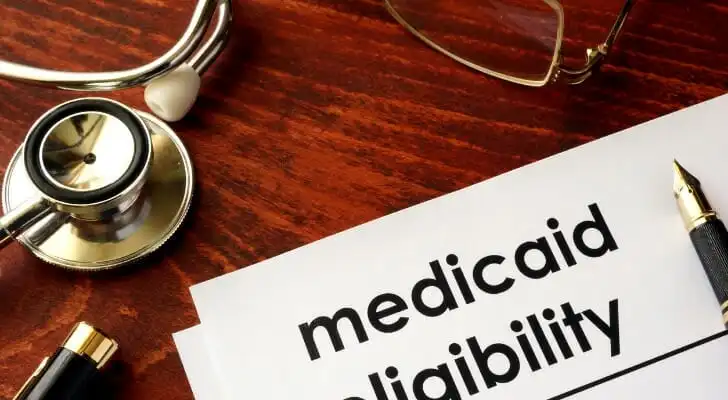Medicaid is a federally run health insurance program designed to help low-income individuals access quality healthcare. To qualify, you must first meet certain income requirements. Eligibility varies by state, but there are some general requirements.
A financial advisor can help you determine if you qualify for Medicaid and other benefits.
Do I Qualify for Medicaid?
The easiest way to check if you’re eligible for Medicaid is to visit the Medicaid website in your state.
Generally speaking, however, you can expect to qualify for a Medicaid program in your state if you make less than between 100% and 400% of the federal poverty level. For a three-person household, the 2026 federal poverty line rests at $27,320.
Medicaid eligibility is based on your household’s modified adjusted gross income (MAGI). Your state likely offers a Medicaid program you can use if you meet income requirements and are one of the following:
- Parent or caretaker
- Pregnant
- Elderly
- Disabled
Most Medicaid programs are exclusively available to U.S. citizens, legal immigrants and permanent residents.
These are the 2026 federal poverty guidelines based on household size:
| Persons in family | Household poverty guideline |
|---|---|
| 1 | $15,960 |
| 2 | $21,640 |
| 3 | $27,320 |
| 4 | $33,000 |
| 5 | $38,680 |
| 6 | $44,360 |
| 7 | $50,040 |
| 8 | $55,720 |
Changes to Medicaid
Medicaid was established in 1965, but the system we know today was very different back then.
By January 1, 2027, all states must adopt a work requirement for Medicaid eligibility. Georgia and Nebraska have already taken action, but the other states will follow.
How to Apply for Medicaid
If you qualify for Medicaid, the application process is generally straightforward. Most states run Medicaid websites, where you can print and fill out an application. You then take your form directly to your local Medicaid office.
You can also visit Healthcare.gov to see if you qualify and whether your state recently expanded coverage.
Income vs. Asset Limits: Medicaid Eligibility

Medicaid eligibility is based on more than just income. For some programs, particularly those tied to long-term care, applicants must also meet asset limits. This means both what you earn and what you own can determine whether you qualify.
Income-based Medicaid programs, such as coverage for children, pregnant individuals and many low-income adults, primarily rely on modified adjusted gross income (MAGI). These programs generally do not apply strict asset tests. If your income falls within your state’s limits, assets may not be reviewed at all.
Long-term care Medicaid, including nursing home coverage and some home- and community-based services, usually applies both income and asset limits. Applicants must often show that their countable assets fall below a set threshold, which varies by state and marital status.
Countable assets can include several types of assets.
- Bank accounts (checking, savings)
- Certificates of deposit (CDs)
- Stocks
- Bonds
- Mutual funds
- Retirement accounts
- Real estate beyond a primary residence
Cash value in life insurance policies above certain limits may also count.
Certain assets are commonly treated as exempt.
- Primary residence up to a state-specific equity limit
- One vehicle
- Personal belongings
- Household goods
Some retirement accounts and prepaid burial arrangements may also receive special treatment depending on state rules.
Because asset rules differ by both state and Medicaid program, it is critical that you review both income and asset categories before applying. This helps identify potential eligibility issues so you know whether additional planning steps may be required.
What Does Medicaid Cover?
Medicaid coverage varies by state, but it generally includes both short- and long-term services.
However, the federal government requires states to provide mandatory medical services, including these.
- Inpatient hospital services
- Outpatient hospital services
- EPSDT: Early and periodic screening, diagnostic, and treatment services
- Nursing facility services
- Home health services
- Physician services
Some states may also offer optional services, such as these.
- Prescription Drugs
- Clinic services
- Physical therapy
- Occupational therapy
- Speech, hearing and language disorder services
- Respiratory care services
Not all Medicaid programs cover prescription drugs. However, your state may pay the premium for Medicare Part D, a prescription drug plan.
Alternatives to Medicaid
If you don’t qualify for Medicaid, you can purchase a health insurance plan on the Marketplace. However, you must do this during open enrollment unless you meet an exemption, such as the loss of a job. You can also buy a private plan from an insurance company.
And, while the individual mandate in the Affordable Care Act no longer requires you to get health insurance to avoid a tax penalty, you should still get coverage.
Bottom Line

Medicaid is a federal health insurance program designed to ensure low-income individuals have access to healthcare when they need it. Eligibility requirements vary by state, so it is best to check with the Medicaid website for your state. If you qualify, you can expect to be covered for doctor visits, hospital expenses, laboratory services and more.
Tips on Navigating the Health Insurance System
- If you plan on entering your golden years before the rest of the pack, check out our guide on how to get health insurance when you retire early.
- If you don’t qualify for Medicaid, don’t fret. A financial advisor can offer valuable insight and guidance. Finding one doesn’t have to be hard. If you don’t have a financial advisor yet, finding one doesn’t have to be hard. SmartAsset’s free tool matches you with vetted financial advisors who serve your area, and you can interview your advisor matches at no cost to decide which one is right for you. If you’re ready to find an advisor who can help you achieve your financial goals, get started now
Photo credit: ©iStock.com/digicomphoto, ©iStock.com/courtneyk, ©iStock.com/designer491
